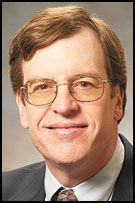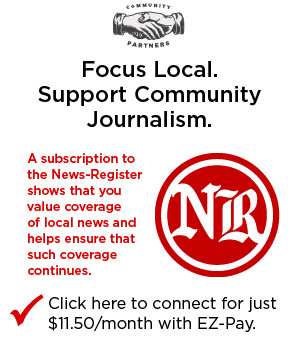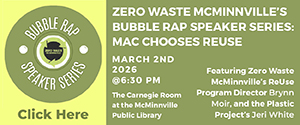Thoburn: A formula for harmony?
I don’t like that man. I must get to know him better.”
That quote is attributed to Abraham Lincoln. Is that just a witty quote, or is it really a formula for better harmony?
In 2009, a former Marine named Richard McKinney entered the Islamic Center in his hometown of Muncie, Indiana. He was there to scout the premises.
His plan was to plant a bomb — one that he hoped would kill 200 Muslims. He had served in the Middle East and had become seared with a considerable hatred for Muslims.
When he entered the Mosque, he looked around. To his war-scarred eyes, he saw nothing but mortal enemies.
“By the end of the night, I figured they would have me in the basement with a sword to my throat,” he would later say.
He remembered the advice of his Marine Corp instructors: “As long as you can look at them as anything but human, you won’t have any problem.”
As he looked around, he counted off his prospective victims, one by one. “Yep, he’s gone. He’s gone.”
Mohammad Saber Bahrami, founder of the Mosque and a leader in the local Islamic community, saw the trouble in McKinney’s eyes. He walked up to McKinney and hugged him. And it was not an artificial gesture, but a genuine, welcoming hug.
“Salam,” Bahrami said, meaning, “You are safe from me. There will be no danger from me.”
“We need to be kind to any guest,” Bahrami later explained.
He and his wife had made a practice of opening their home to people in need. They had been doing so for years, and they did so for McKinney.
In the weeks that followed, McKinney returned to the Mosque many times during community dinners and during prayers. As his understanding increased, his hatred melted.
“He was hugging the people he wanted to choke,” Bahrami explained.
Eight weeks later, McKinney became a Muslim. He now speaks of the Quran telling him that to kill one human being is as if you killed all of humanity, but to save one human being is as if you saved all of humanity.
He went on to serve for two years as president of the Mosque, and now tours the country speaking of his experience converting from hatred to love.
A documentary has been made of McKinney’s experience, titled “Stranger at the Gate,” and available on YouTube.
I chose Islam for my example here because, for obvious reasons, it has become much maligned over the last two decades.
Certainly, there are criminal and terrorist elements who use the cover of Islam to justify their personal hells. But this is not the Islam you will find if you “get to know it better.”
Islam has five “pillars,” or fundamental principles. One of those is charity.
Muslims are expected to contribute some portion of their excess earnings to those less fortunate. Often, one of the elements of their holiday celebrations is service to the poor, in the same way that Americans celebrate the Fourth of July with fireworks.
If Muslims don’t have money, they share what they have. For example, the intelligent man can help teach children, sharing his particular “wealth.”
Chaplain Asma Inge-Hanif is the founder and executive director of Muslimat Al-Nisaa, an Islamic charity based in Baltimore, Maryland. She has served her community for 30 years.
Her organization provides health, education and social services to whoever needs them, regardless of ability to pay. She says it has served thousands of people over the years. And she serves on a volunteer basis, taking no salary for herself.
She almost lost her life to COVID, and did lose the lease to the shelter from which she operated. As a result, she now struggles out of makeshift premises.
But she continues to provide services to not just Baltimore’s homeless, but also to refugees arriving from Afghanistan and elsewhere. She is a Muslim, and a luminous example of Islam’s principle of selfless charity.
Islam is not the only religion to suffer a lack of understanding.
Just this last Sept. 17, our Oregon Ducks played Brigham Young University, a private university founded on the beliefs of the Church of Jesus Christ of Latter-day Saints. Late in the game, the Oregon student body took up the chant of “F___ Mormons!”
Apologies – sincere apologies – have been issued. OK, fine. But what kind of people are these “Latter-day Saints” to be so reviled?
They eschew the label “Mormon,” by the way, and out of respect to their wishes, I will do the same here.
I make a hobby of studying the history, practices and beliefs of various religions.
I recently studied those of the Church of Jesus Christ of Latter-day Saints, and I came away amazed at the sense of community and charity. One news story in particular caught my attention.
In the months before Russia invaded Ukraine, the Latter-day Saints began sending people and supplies to outposts on the roads leading away from Ukraine, in anticipation of the flood of refugees that a Russian invasion would engender.
Sister Sharon Eubank, president of the Church of Jesus Christ of Latter-day Saints’ charity arm, explained:
“We’re not just there for the first month or the first week. We will stay until that situation is resolved… The disaster is only the very beginning. What we really care about is helping people spiritually, emotionally and physically recover and build their societies back.”
We could get to know the Oregon students better. We might find that alcohol, rather than any sincere animus, fueled their chant. We might even find a few who would join the Latter-day Saints on the roads leading out of Ukraine.
Understanding requires communication, and it takes courage to communicate. But we are a courageous people.
There isn’t enough room here to paint a complete picture of, or make a complete case for, any one religion, much less all. But we live in an increasingly anti-religious age, and an age of increasing religious jingoism.
Those encrustations can be dissolved with understanding. They are not the principles our country was founded on.
“The legitimate powers of government extend to such acts only as are injurious to others,” wrote Thomas Jefferson in 1782, arguing for religious neutrality and respect in the nascent United States of America. “But it does me no injury for my neighbor to say there are 20 gods, or no god. It neither picks my pocket nor breaks my leg.”
I’d like to end this with one last Abe Lincoln aphorism: “Do I not destroy my enemies when I make them my friends?”
We should all destroy our enemies thus.













Comments